#factoryfarm
Photo

Interested in going more plant-based? Here are some of my favorite vegan/plant-based resources! Hot Tip: If you're not interested in going "full vegan", simply ignore any "vegan" versions of things like cheeses, milks, etc - use the dairy versions instead! When I first started exploring veganism, I mostly used these books to see where I could do without cheese/dairy/etc. 1. Forks Over Knives is not only a documentary, it's also a series of cookbooks, an app, and a magazine. I personally buy the magazine, which comes out quarterly, but the cool thing about FOK is that pretty much all of their recipes end up on their website (making it a good, free resource, too!) 2. Gamechangers also has a cookbook and is one of my favorite documentaries on the subject, but they also include many crowd-pleasing recipes. 3. The Vegan Stoner is a website I've visited for years, but they have recently compiled some of their best recipes into a few cookbooks now! 4. Vegan Comfort Food and Vegan Celebrations are both authored by Alicia C. Simpson (who I personally consider one of the best less-known vegan cookbook authors. I love the menus and the fact that Celebrations is actually organized by holiday! I personally own both now, but I've also borrowed these from the library! 5. Last but definitely not least, Sauce Stache! He's one of my favorite vegan YouTube cooks. While I wouldn't call many of his recipes "healthy" or true to the "plant based" ideals set in FOK/Gamechangers, I'm amazed at some of the stuff he comes up with! I more consider him a "vegan food scientist/chemist" but am STILL amazed by his Vegan Fried Egg and I'm considering trying his wheat bacon! --- Check out our most recent episode where we talk about Whether People Should Become Vegetarian - Part 2 (Episode 273)! Click the link in our profile to find where you can listen to Friends Talking Nerdy. We hope you join us. #factoryfarms #factoryfarming #veganrecipes #healthydiet #animals #veganpasta #animalagriculture #endfactoryfarming #factoryfarm #animalwelfare #eatlessmeat #dairyisscary #plantbased #environment #savetheplanet #environmentallyfriendly #pollution #podcaster #podcast #podcastingtips https://www.instagram.com/p/CjE2bM0uMEY/?igshid=NGJjMDIxMWI=
#factoryfarms#factoryfarming#veganrecipes#healthydiet#animals#veganpasta#animalagriculture#endfactoryfarming#factoryfarm#animalwelfare#eatlessmeat#dairyisscary#plantbased#environment#savetheplanet#environmentallyfriendly#pollution#podcaster#podcast#podcastingtips
0 notes
Text
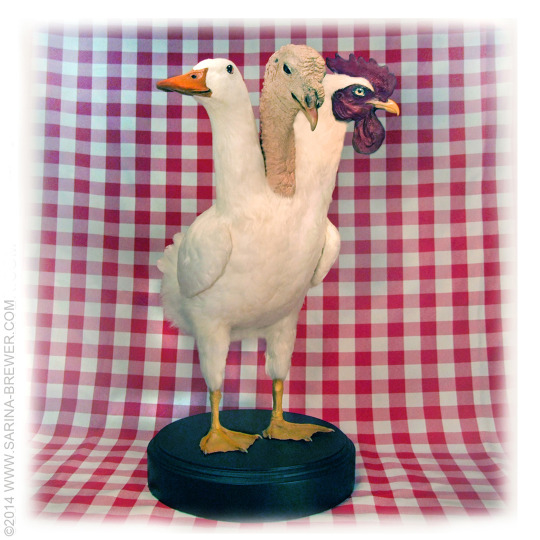
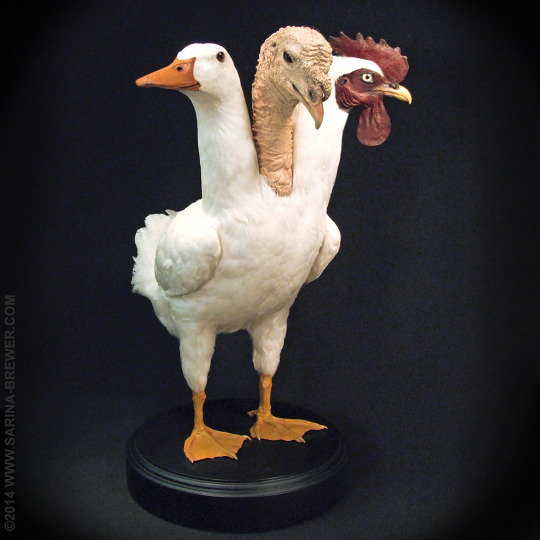
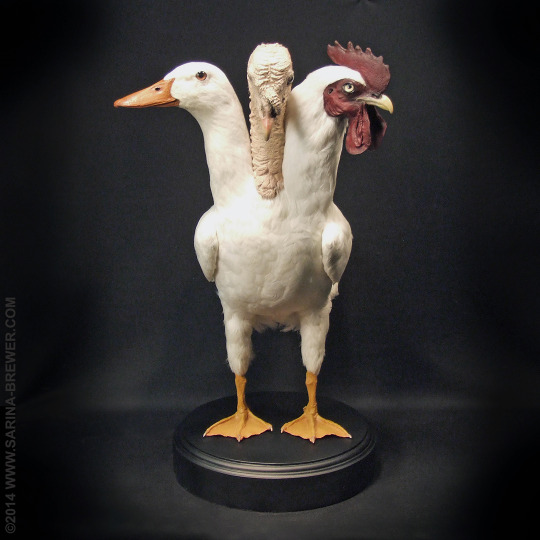

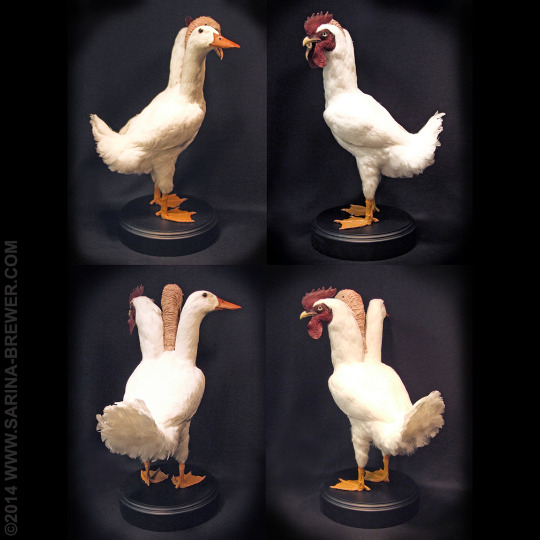
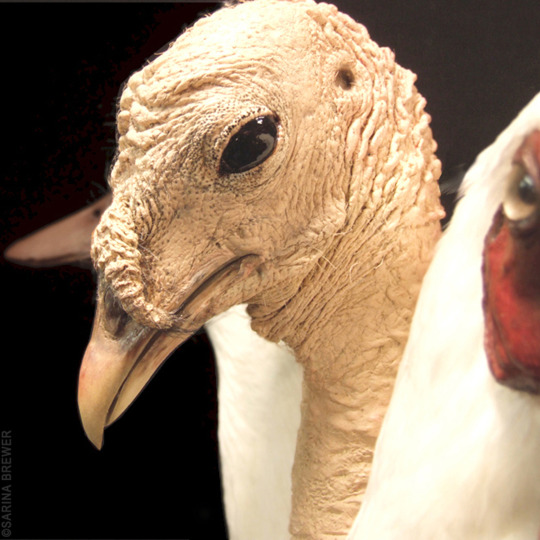
Be Thankful
Glazed in beguiling dark humor, this taxidermy sculpture has a serious message that rings even more true today than it did when I originally made the piece ten years ago. As most of you likely have heard, the population of Earth just reached 8 billion. In the span of a mere decade since this sculpture was created, an additional billion humans now live on the planet. Below is the statement that accompanied this sculpture the first time it was exhibited in 2014 in a themed exhibition titled Fruitful and Multiplying – The Overpopulation Exhibit. So much for progress.
___________________________________________
TITLE: Turducken à la Monsanto
MATERIALS: Domestic duck, turkey, and rooster skins
“This piece is a commentary on the absurdity and entitlement of gourmet foods, the privilege of being able to allocate food for the purpose of art, and the disconcerting technology of interspecies grafting performed by the bioengineering industry. The strain on our planet's resources has become immense as the population of Earth crests 7 billion. With a tipping point looming, genetic engineers are creating hybrid species of livestock and crops designed to produce the highest yield possible while using the least amount of resources. The reality is many developing countries do not have the means to utilize this controversial technology and only an elite portion of the Earth's population will profit from these so-called advances. We live in a country rich in all resources. It enables us to use food towards a myriad of frivolous ends, including our entertainment. We create designer cuisine that is more about status than it is about sustenance, and we feed human quality food to our pets. While we enjoy our luxury foods, for much of the world just having food is a luxury.” ~
___________________________________________
I recently culled a number of works from my personal collection to offer for sale. This sculpture is among a handful of others that are now available. Link here for price list
___________________________________________
#PopSurrealism#EnvironmentalArt#EcologicalArt#EcoArt#FactoryFarming#GeneticEngineering#Geoengineering#Bioengineering#Biotechnology#biotech#GeneSplicing#crispr#Chimera#FeedThePlanet#FeedTheWorld#PopulationGrowth#PopulationControl#Monsanto#Turducken#ThanksgivingArt#PopSurrealist
7 notes
·
View notes
Text
Monday's image: February 12, 2024
Narsiso Martinez, Royal-ty, Ink, gouache, charcoal, and gold leaf on found produce boxes, 77 x 108 inches, 2021, Amon Carter Museum of American Art, Forth Worth, Texas
#mc_embed_signup{background:#fff; false;clear:left; font:14px Helvetica,Arial,sans-serif; width: 600px;} /* Add your own Mailchimp form style overrides in your site stylesheet or in this style block. We recommend moving this block and the preceding CSS link to the HEAD of your HTML file. */
Subscribe to Monday's image
* indicates required
Email Address *
(function($) {window.fnames = new Array(); window.ftypes = new Array();fnames[0]='EMAIL';ftypes[0]='email';fnames[1]='FNAME';ftypes[1]='text';fnames[2]='LNAME';ftypes[2]='text';fnames[3]='ADDRESS';ftypes[3]='address';fnames[4]='PHONE';ftypes[4]='phone';}(jQuery));var $mcj = jQuery.noConflict(true);
#sufferingfinancialloss#needforaction#Wehaveoneofthebestjobsintheworld#butatsunamiiscomingourway#Nooneislisteningtous#Ifthingscontinuelikethis#patientswillsoonhavetowait#twotofiveweeksforanappointment#NarsisoMartinez#mixedmedia#painting#drawing#produceboxes#farmworkers#factoryfarms#protestsigns#cowmasks#angryfarmers#buckets#Aalst#UnrestamongGPsreachesboilingpoint#healthcare#FrustrationsindoctorsinternalFacebookgroup#callforactiongettinglouder#VjenDeBruycker#generalpractitionerLeffinge#conflictingpolicies#Vooruit#TomMeeuws#clashingwithinAntwerp'scouncil
0 notes
Text
The Unsustainable Truth: How Animal Agriculture is Killing Our Planet

Introduction:
When most people think of climate change, they often picture exhaust-belching cars or smokestacks emitting plumes of pollution. While these sources undoubtedly contribute to the problem, there is another culprit with an even more significant impact on our planet: animal agriculture. Responsible for a tremendous carbon footprint, the livestock industry plays a substantial role in exacerbating climate change. In this blog post, we will explore the environmental consequences of animal agriculture's carbon emissions and discuss sustainable alternatives to mitigate its impact.
The Link between Animal Agriculture and Carbon Emissions

Unveiling the workings of greenhouse gas emissions in animal agriculture:
Methane, a potent greenhouse gas (GHG) emitted during enteric fermentation and manure management, is a major contributor to animal agriculture's carbon footprint. Cows, for instance, release considerable amounts of methane through their digestive processes. Additionally, nitrous oxide emissions from manure management and synthetic fertilizers further exacerbate the problem. Moreover, the indirect carbon emissions associated with deforestation for pastureland and feed production must not be overlooked.
Statistical evidence illustrating the scale of animal agriculture's carbon footprint:
To comprehend the magnitude of the issue, it is imperative to examine the numbers. Globally, livestock production is estimated to generate nearly 15% of all human-induced GHG emissions. That surpasses the emissions from the entire transportation sector, including cars, trucks, ships, and airplanes. Furthermore, animal agriculture is responsible for approximately 80% of all deforestation in the Amazon rainforest, leading to a loss of biodiversity and further increasing carbon emissions.
Environmental Consequences of Animal Agriculture's Carbon Footprint

Impact on climate change:
The staggering emissions from animal agriculture greatly contribute to the greenhouse effect and subsequent global warming. As a result, we are witnessing severe weather patterns, melting glaciers, and rising sea levels. The emissions create a vicious feedback loop, exacerbating climate change and its impacts on ecosystems and communities worldwide.
Deforestation and loss of biodiversity:
Animal agriculture drives deforestation on a massive scale. Immense areas of valuable rainforests are cleared to create pastureland for livestock or grow feed crops like soybeans and corn. This destruction of natural habitats leads to the loss of countless plant and animal species, disrupts the delicate balance of ecosystems, and releases stored carbon into the atmosphere.
Water scarcity and pollution:
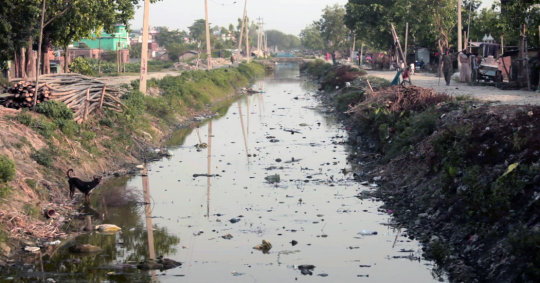
Animal agriculture accounts for a considerable portion of global freshwater consumption. Water is needed to irrigate crops for animal feed and provide drinking water for livestock. Consequently, it contributes to water scarcity in many regions. Furthermore, the intense use of fertilizers and the improper management of animal waste leads to water pollution, as runoff carries excess nutrients and pathogens into rivers and oceans.
Sustainable Alternatives to Mitigate Animal Agriculture's Carbon Footprint
Plant-based diets and their environmental benefits:
One of the most effective actions individuals can take to reduce animal agriculture's carbon footprint is to adopt plant-based diets. By choosing plant-based alternatives over meat and dairy, we can reduce the demand for livestock feed crops, decrease deforestation rates, and mitigate emissions associated with animal agriculture. Plant-based diets not only have numerous environmental benefits but also promote personal health and animal welfare.
Technological advancements and innovative solutions:
The emergence of technological advancements offers hope for a more sustainable future. Clean meat, also known as lab-grown or cultured meat, aims to produce real meat without the need for traditional animal farming. This method requires significantly fewer resources, reduces methane emissions, and eliminates the need for deforestation. Additionally, sustainable farming practices, such as regenerative agriculture and improved waste management, can help mitigate the carbon footprint of animal agriculture.
Policy changes and industry transition:
While individual actions are crucial, systemic change is necessary to address the environmental impact of animal agriculture. Governments must implement policies that incentivize sustainable farming methods, support research in alternative protein sources, and promote the consumption of plant-based products. Additionally, consumer awareness and demand for eco-friendly products can exert pressure on the industry, encouraging the adoption of sustainable practices at a larger scale.
Conclusion:
The unsustainable truth is clear: animal agriculture is playing a significant role in the degradation of our planet. Its vast carbon emissions contribute to climate change, deforestation, water scarcity, and the loss of biodiversity. However, by adopting plant-based diets, supporting technological advancements, and driving policy changes, we can make a positive impact. In the face of this global crisis, it is crucial for individuals, industries, and governments to come together and take responsibility for creating a more sustainable future.
#FactoryFarms#MeatFreeMonday#CrueltyFreeFood#VeganLifestyle#SaveTheAnimals#NoMoreFactoryFarms#EndFactoryFarming#GoGreenGoVegan#SaveThePlanetEatPlants#ProtectOurOceans#SaveOurAnimals#GoVeganForYourPeace
0 notes
Text
#cheeseburger#nationalcheeseburgerday#fastfood#slaughter#factoryfarms#factoryfarming#restraunt#drivethroughrestraunts#cows#cattle
1 note
·
View note
Audio
(John Stea (song writer))
0 notes
Photo
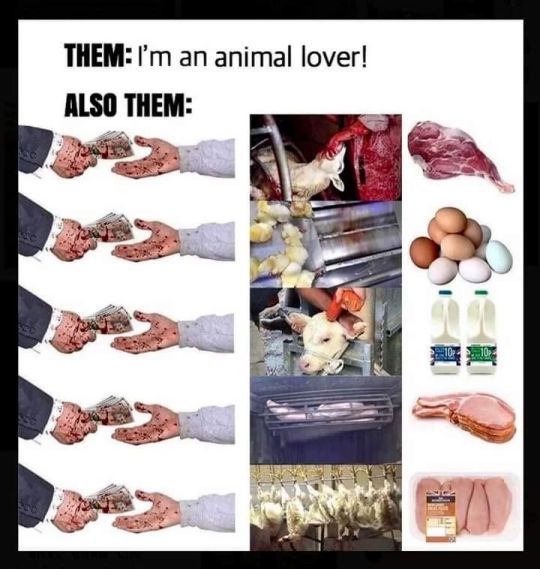
Dont support animal exploitation, go vegan. 🌱 👀For what the meat, dairy and egg industry does not want you to see go to: DontWatch.Org __ #govegan #bevegan #endspeciesism #veganfortheanimals #meatlovers #meat #meatindustry #factoryfarming #animalag #animalagriculture #animalrights #animalliberation #animallivesmatter #oppression #injustice #unjust #slavery #slaverystillexists #holocaust #humangreed #stophate #endoppression #socialjustice #humanrights #climateactivist #climatecrisis #wildlifephotography #animallovers #justbekind #nonviolence https://www.instagram.com/p/CoAEk6dukfq/?igshid=NGJjMDIxMWI=
#govegan#bevegan#endspeciesism#veganfortheanimals#meatlovers#meat#meatindustry#factoryfarming#animalag#animalagriculture#animalrights#animalliberation#animallivesmatter#oppression#injustice#unjust#slavery#slaverystillexists#holocaust#humangreed#stophate#endoppression#socialjustice#humanrights#climateactivist#climatecrisis#wildlifephotography#animallovers#justbekind#nonviolence
0 notes
Text
This blog is to share my journey to follow the main ideas of these books (just to start):
1. Braiding Sweetgrass by Robin Wall Kimmerer
2. Sand County Almanac by Aldo Leopold
3. The Omnivore’s Dilemma by Michael Pollan
#environmental health#food centered Justice#ecofeminism#foraging#north america#sustainability#factoryfarming#nature conservancy#conservation#environmental conservation and preservation
1 note
·
View note
Text
Inside The Chicken Coop Short Story Theater
0 notes
Text
Contre l’élevage intensif, https://don.ciwf.fr/page/115313/donate/1?_gl=11w2thzh_gaMTA5NzY3MjUyNS4xNjkzNTE3OTU1_ga_RMC05PGGT7*MTY5MzUxNzk1NS4xLjAuMTY5MzUxNzk1Ny42MC4wLjA.&supporter.appealCode=CAPWE_FR0723c&utm_campaign=factoryfarming&utm_medium=ciwf&utm_source=linkea.tracking.id=link&supporter.appealCode=CAPWE_FR1122&utm_campaign=factoryfarming&utm_source=link&utm_medium=ciwf
https://www.youtube.com/watch?v=hbRXHHZ15d0
Cet ouvrage sera disponible aussi, pendant la quinzaine où je vais exposer à Doudeville, du 4 septembre au 17 septembre, à la maison du lin.
J'aborde dans cet ouvrage, bien des choses sur l'aviculture, en tant qu'amateur, mais aussi, bien au delà, parce que j'ai participé à la sélection d'une poule en voie de disparition, qu'on appelle "la Pavilly", et ai poussé le bouchon jusqu'à aller l'exposer au salon de l'agriculture, ) Paris, porte de Versailles, avant que la grippe aviaire ou autres maladies, n'aient eu pour conséquence que les expositions avicoles, nous ait interdit d'en organiser.
0 notes
Text
0 notes
Photo
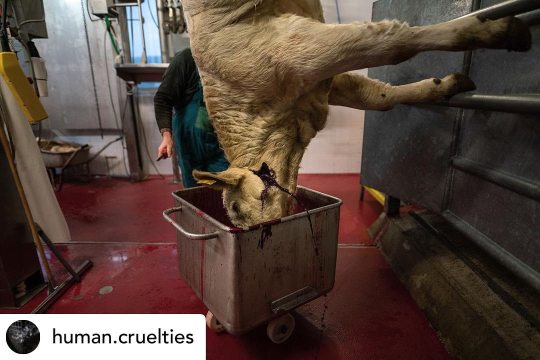
Posted @withregram • @human.cruelties personal choice sometimes means blood on your hands, which you don't even realize because no one made you aware of it. for the worker, it's another day at work, cruel and terrible, for the consumer, another piece of meat on the plate, for the victim, death, suffering, lifelong slavery. #animalrights #animalliberation #animalwelfare #animalactivist #veganphotographer #veganphotography #animalphotography #saveanimals #animallivesmatter #help #empathymatters #empathy #compassion #friendsnotfood #animallovers #meatismurder #meatfree #whyvegan #animalcruelty #slaughterhouse #cow #veganactivist #veganlife #sonypolska #factoryfarming #speciesism #sonyalpha https://www.instagram.com/p/Cndu724OOFx/?igshid=NGJjMDIxMWI=
#animalrights#animalliberation#animalwelfare#animalactivist#veganphotographer#veganphotography#animalphotography#saveanimals#animallivesmatter#help#empathymatters#empathy#compassion#friendsnotfood#animallovers#meatismurder#meatfree#whyvegan#animalcruelty#slaughterhouse#cow#veganactivist#veganlife#sonypolska#factoryfarming#speciesism#sonyalpha
0 notes
Photo
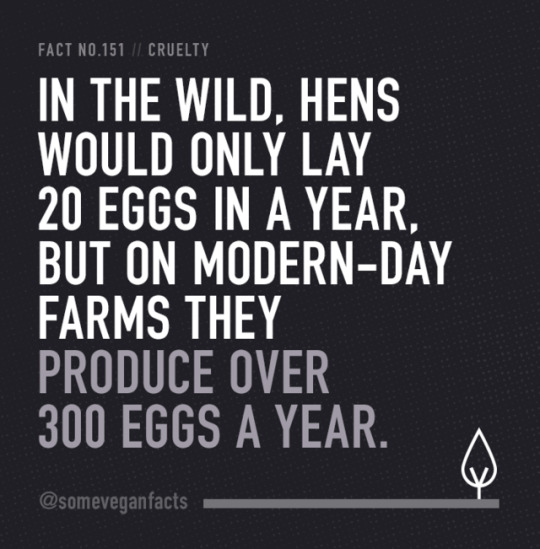
Fact 151. In the wild, hens would only lay 20 eggs in a year, but on modern-day farms they produce over 300 eggs a year.
Source // https://www.viva.org.uk/egg-factsheet (Origin: Hendrix Genetics website, 2015; World Poultry website, 2016)
#eggs#cruelty#hens#veganfacts#someveganfacts#factoryfarm#factoryfarming#veganism#vegansofinstagram#vegansoftumblr
70 notes
·
View notes
Photo
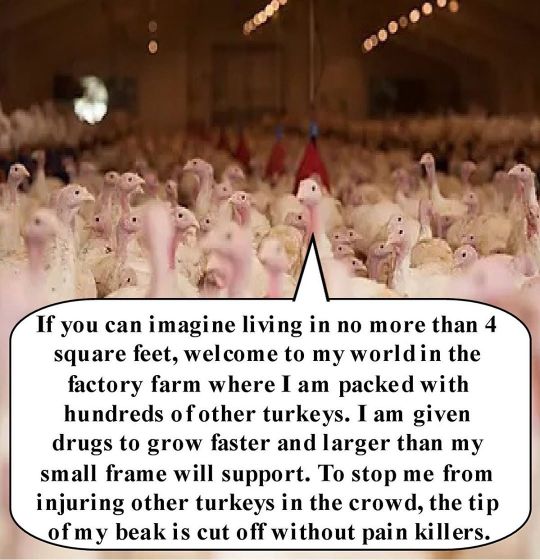
"No more than 4 square feet.”
#animalwelfare#animalliberation#welcometomyworld#antianimalabuse#turkeys#turkeyfood#thanksgiving#thanksgiving🦃#govegan#factoryfarm#factoryfarming#four#food#turkeysarefriendsnotfood#crowded#crowdedplaces#crowds#seemeatdifferently
1 note
·
View note
Photo
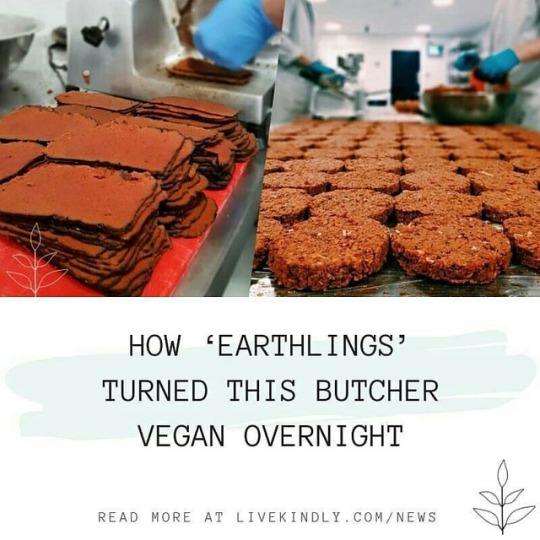
Reposted from @livekindlyco - "Suddenly the idea of putting something dead inside my body didn’t feel right." . . . . #vegan #veganism #vegetarian #vegansofig #livekindly #flexitarian #vegancommunity #vegannews #plantbased #Earthlings #NYC #FoieGrasBan #FactoryFarm #Pig #ValentinesDay #Flexitarian #VeganBeauty #Avocados #Biodegradable #PlasticFree #veganvalentines - #regrann https://www.instagram.com/p/BtmI7pqDqEG/?utm_source=ig_tumblr_share&igshid=kskj0gqimfy
#vegan#veganism#vegetarian#vegansofig#livekindly#flexitarian#vegancommunity#vegannews#plantbased#earthlings#nyc#foiegrasban#factoryfarm#pig#valentinesday#veganbeauty#avocados#biodegradable#plasticfree#veganvalentines#regrann
4 notes
·
View notes
Photo
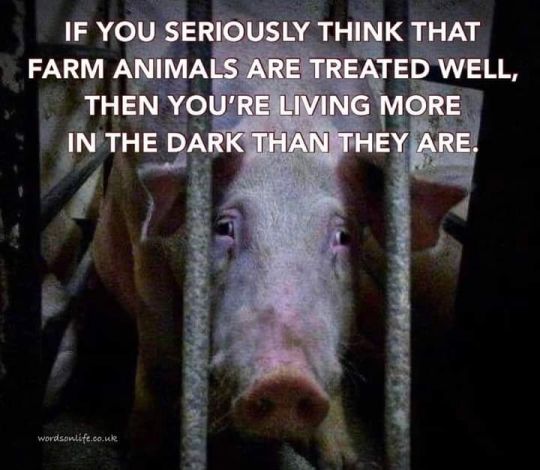
Humane animal products are a lie 🐷💔 Humane means compassion and benevolence, the most humane thing we can do is leave animals off our plates 🍽️and go vegan. 🌱 (Message me for free help) For the truth go to: DontWatch.Org (Only 7 minutes) 👀*link in bio* __ #govegan #veganism #vegan #animalrights #animalliberation #animalagriculture #factoryfarming #meatindustry #humane #humanemeat #freerange #grassfed #organicmeat #localmeat #meatlovers #meat #pigs #pigsofig #food #foodie #bacon #ham #pork #sustainability #climatechange #climatecrisis #ketodiet #carnivorediet #meateater #foodpics https://www.instagram.com/p/Cnk6wszJyxF/?igshid=NGJjMDIxMWI=
#govegan#veganism#vegan#animalrights#animalliberation#animalagriculture#factoryfarming#meatindustry#humane#humanemeat#freerange#grassfed#organicmeat#localmeat#meatlovers#meat#pigs#pigsofig#food#foodie#bacon#ham#pork#sustainability#climatechange#climatecrisis#ketodiet#carnivorediet#meateater#foodpics
0 notes